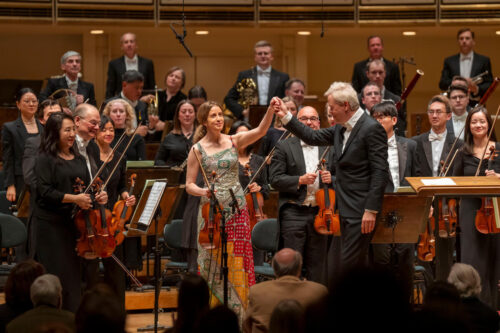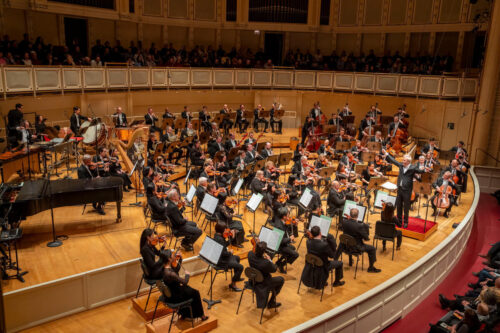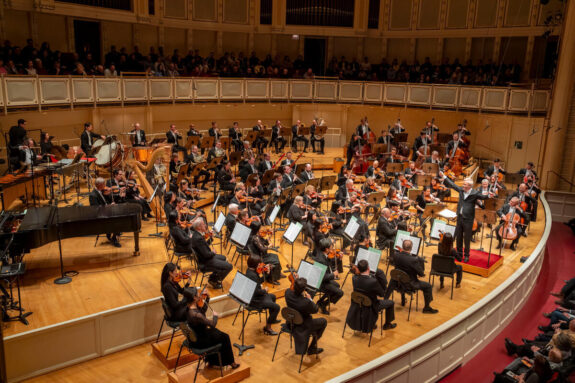 United States Various: Vilde Frang (violin), Chicago Symphony Orchestra / Hannu Lintu (conductor). Orchestra Hall, Chicago, 21.11.2024. (ZC)
United States Various: Vilde Frang (violin), Chicago Symphony Orchestra / Hannu Lintu (conductor). Orchestra Hall, Chicago, 21.11.2024. (ZC)

Adams – Slonimsky’s Earbox
Stravinsky – Violin Concerto in D
Gubaidulina – Fairytale Poem
Tchaikovsky – Suite from Swan Lake
Chicago’s first snowfall of the season marked the return of Hannu Lintu to Orchestra Hall, though an afternoon rise in temperature meant that the snow had changed to rain and a steady melt by the time the maestro ascended the podium. The meteorological pivot in some ways mirrored the contrasts the Finnish conductor was bringing to the Chicago Symphony Orchestra.
On his previous visit to Chicago, Lintu balanced the familiar and the unexpected, pairing well-known crowd-pleasers by Shostakovich and Tchaikovsky with seldom-performed works by Saariaho and Mussorgsky. For this engagement, Lintu – joined by Norwegian violinist Vilde Frang, a rising star with an already formidable reputation – brought a program just as intriguing, with contrasts between pieces that exuded entertaining push-and-pull tension.
The program unfolded as a tale of two halves. Lintu opened with John Adams’s Slonimsky’s Earbox and Stravinsky’s neoclassical Violin Concerto in D, works brimming with rhythmic energy, vivid orchestral colors and tonal surprises. Adams’s kaleidoscopic score, a tribute to the eccentric musicologist Nicholas Slonimsky, blended minimalist overtones with intricate counterpoint. Inspired by Stravinsky’s Le Chant du Rossignol, it sparkled with wit and complexity. Slonimsky’s Earbox was a turning point for Adams: by his own admission, his minimalist roots evolved into something richer, with more blended and expansive orchestral textures. In contrast, the Stravinsky offered a different kind of charm, its sharp dissonances offset by moments of serene, crystalline beauty. Paired together, the works set the stage for a program both intellectually engaging and sonically rewarding.
In the second half, the orchestra shifted focus to Sofia Gubaidulina’s Fairytale Poem and a suite from Tchaikovsky’s Swan Lake. Despite their separation by nearly a century, these programmatic works are surprising complements to one other. Both weave introspective themes with vivid storytelling – Tchaikovsky’s is a cornerstone of Russian orchestral tradition, filled with lyrical beauty and symphonic grandeur, while Gubaidulina’s Fairytale Poem is a sweet, introspective piece of anticipation. Together, they bridged themes of transformation and artistic expression.
Fairytale Poem is rooted in a symbolic, deeply personal story: a piece of chalk dreams of creating beauty but is confined to routine tasks. The chalk’s journey from despair and darkness to making magnificent drawings is an allegory for artistic longing and the sacrifices inherent in the creative process. Gubaidulina described the work as a meditation on the transcendence of the human spirit, a story that finds its voice in music which shifts between despair and elation, each emotional turn painted in vivid, otherworldly tones. Her score is spare yet expressive, with a mystical soundscape that lingers long after the final note.

The program unfolded like a musical palindrome, the two halves mirroring each other in scale and effect. Slonimsky’s Earbox, a large-scale orchestral showcase, gave way to the more compact forces of Stravinsky’s Violin Concerto. Similarly, Gubaidulina’s smaller-scale, more introspective work acted as a prelude to the lush, full-bodied sound of Swan Lake. Under Lintu’s baton, the palindromic progression felt cohesive and electrifying.
Lintu adjusted his approach with skill to match the unique demands of each piece. In Slonimsky’s Earbox, his precise direction let the music bristle with energy, with the CSO’s brass and winds providing a welcome edge. For Swan Lake, he shifted to a more relaxed stance, saving his most expressive gestures for the work’s showier moments. The finale swelled gloriously, its enveloping sound filling Orchestra Hall. Special praise is due to John Sharp (principal cello), Stephanie Jeong (associate concertmaster) and William Welter (principal oboe), whose contributions in Swan Lake were both delicate and profoundly musical. Yet, Gubaidulina’s Fairytale Poem was the highlight of the evening for me. Its sparse, introspective world may not appeal to all listeners, but the CSO delivered a lucid and deeply committed performance of this Soviet-era masterpiece.
The weakest link in the program was Stravinsky’s Violin Concerto. Frang, known for her advocacy of lesser-performed concertos, brought her characteristic technical brilliance to the stage. In her debut with the CSO, she tackled Stravinsky’s demanding passages with ease, but her musical presence fell short of commanding full attention. I remember having similar feelings about her performance of Elgar’s Violin Concerto in Seattle some years ago.
Here, as then, she struggled to match the CSO. She was somewhat overpowered by the orchestra at the start, and the best moments came when the violin was not in the spotlight. As the concerto progressed, Frang and the orchestra found better balance and gave the performance a more unified momentum. In the end, Frang and the CSO delivered a much-needed structural pivot in a program that balanced intellectual rigor with emotional depth, navigating transitions as striking and unpredictable as the shifting weather outside.
Zach Carstensen

We saw Vilde Frang play the Kornold Violin Concerto a week ago at Carnegie Hall with Petrenko and the Berlin Phil. Interestingly, the balance was not ideal in that concert either, with Frang unable to project a large enough tone to completely satisfy this listener, who was seated in the upper balcony. In contrast, when you listen to her perform the same piece with the same conductor and orchestra on the Berlin Phil’s Digital Concert Hall (performed at the Philharmonie just a week before the Carnegie Hall concert), the balance is very satisfying and all the nuance in Frang’s fantastic technique and phrasing is apparent. The balance is also excellent in her performance of the Korngold with the Frankfurt Radio Symphony.
Hi Jon, thank you for the comment. Maybe she is one of those musicians who comes across better in a recorded medium? What a disappointment that you couldn’t hear her given how accommodating the acoustics are in Carnegie Hall.